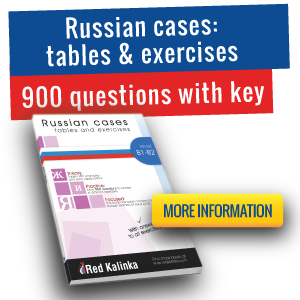Questions and Answers 06-10
Find an answer to your doubts about Russian grammar and vocabulary
Our language experts have gathered here the most common and interesting questions about Russian grammar and vocabulary. Discover the secrets of Russian verbs, case system and pronunciation.
6. What’s the difference between “если” and “ли”? Do they both mean “if”?
It's very easy to mix up the words "ли" and "если" when you learn Russian because both words can be translated into English as "if". In Russian they are quite different from each other. Let's see how to use them correctly.
We use "если" to express a condition:
- Если завтра будет дождь, я буду дома. = If it rains tomorrow I'll stay at home. Pay attention that in Russian, we have to use future in both parts of the sentence (будет дождь, я буду дома).
- Ты можешь взять мой велосипед, если хочешь. = You can take my bike if you want.
- Если я буду в городе, я позвоню тебе. = If I'm in town I'll call you.
We use "ли" to express a doubt about something. You can also translate it as "whether". In fact, try to associate "ли" with "whether" in your mind and you won't mix it up with "если" any more. Let's have a look at the examples:
- Я не знаю, будет ли завтра дождь. = I don't know whether tomorrow it's going to rain.
- Я спросил его, хочет ли он взять мой велосипед. = I asked him whether he wanted to take my bike.
- Я не знаю, буду ли я в городе. = I don't know whether I'm going to be in town.
Where should I put "ли" in a sentence? We usually put "ли" after the word that expresses the actual doubt. Compare these sentences:
- Я не знаю, купил ли он хлеб. = I don't know whether he bought bread.
- Я не знаю, хлеб ли он купил. = I don't know whether it was bread that he bought (or something else).
- Я не знаю, он ли купил хлеб. = I don't know whether it was him who bought the bread.
As you must have noticed the "doubt" always comes first in the subordinate clause. If you change the word order you will also change the focus of the doubt.
7. How to say "I have" and "I don't have" in Russian?
Saying "I have" in Russian is a little tricky because we don't use the verb "to have" in this meaning. Instead of this verb, we use the construction "У меня есть..." which literally means "In my possession there is..." Let's have a look at some examples:
- У меня есть кошка. = I have a cat (literally we say "In my possession, there is a cat").
- У тебя есть братья? = Do you have any brothers? (literally "In your possession, are there any brothers?)
- У него есть дом в деревне. = He has a house in the countryside (literally "In his possession, there is a house in the countryside).
As you might have noticed, after the preposition "У" we have to use the genitive case (у меня / у тебя / у него / у неё / у нас / у вас / у них). The thing that we possess is used in the nominative case because it's the subject of the sentence.
How to say "I don't have" in Russian? To say "I don't have" we have to change the word "есть" for "нет" (У меня нет......). But be careful! After the word "нет" we have to use the genitive case:
- У меня нет кошки. = I don't have a cat (literally we say "In my possession, there is no cat").
- У тебя нет братьев? = Don't you have any brothers? (literally "In your possession, are there no brothers?)
- У него нет дома в деревне. = He doesn't have a house in the countryside (literally "In his possession, there is no house in the countryside).
8. When should I omit "есть" in Russian? Do "У меня есть" and "У меня" mean the same?
You probably know that in Russian we use the construction "У меня есть + the Nominative case" to express possession ("I have..."). However, there are sentences where "есть" is omitted.
It happens when instead of expressing possession, we give a characteristic of something. Let's see some examples:
- У меня хороший характер. = My character is good. (You can also translate it as "I have a good character". What matters here is the quality of the thing, not the fact of having it. In the end, everybody has a character but not everybody has a good character.)
- У неё короткие волосы. = She has short hair
- У тебя длинный отпуск? = Is your vacation long?
Attention! We often omit "есть" when we describe people's appearance. The most common mistakes among Russian students are the following:
- У меня зелёные глаза. (not "У меня есть...") = I have green eyes.
- У неё длинные волосы. (not "У неё есть...") = She has long hair.
- У него большие уши. (not "У него есть...")= He has big ears.
If you forget to omit "есть" these sentences sound a bit funny for a Russian ear. Since "есть" expresses possession it sounds like you are saying "I have eyes" rather than saying that they are green.
Pay attention to how you can express negation in these situations. You just have to put "не" before the word you negate:
- У него не короткие волосы, а длинные. = His hair is not short, but long.
- У них не зелёные глаза, а голубые. = Their eyes are not green, but blue.
If you use "нет" you will negate the fact of having something whatsoever. For example:
- У него нет волос. = He doesn't have any hair.
- У монстра нет глаз. = The monster doesn't have eyes.
9. How should I use "нравиться" in Russian?
When you translate “I like” into Russian you might have some difficulties, as the verb “нравиться” is not exactly “to like”, but rather “to be liked”, or “to be enjoyable, pleasing”. Compare:
- Мне нравится книга. = I like the book (literally we say: "the book is liked by me/the book is enjoyable for me").
Pay attention that "the book" or "what you like" is in the nominative case because it's the subject of the sentence and the verb “нравиться” agrees with it (depends on its gender and number (singlular or plural)). Accordingly, "the one who likes" would be in the dative case:
- Книга нравится. Кому? Мне. = The book is enjoyed. By whom? (who enjoys it?) (By) me.
When "what you like" is expressed by an infinitive, "нравиться" will be in the 3d person, neuter. For example,
- Мне нравится читать. = I like reading .
- Мне нравилось читать раньше. = I liked reading before.
Note that the verb "нравиться" has all the conjugation forms": "я нравлюсь, ты нравишься, он нравится, вы нравитесь, мы нравимся, они нравятся". But be careful! The grammar structure is the contrary to the English one, and it looks very misleading. Compare:
- Я нравлюсь ему. = He likes me (literally, "I am liked by him").
- Ты нравишься нам. = We like you. (literally, "You are liked by us").
Attention! The perfective form of "нравиться" is "понравиться" . It means that you will mostly use it for a single occasion and/or with a certain result in the future or the past. Important that we use this form to express our opinion (= in English: I love it! I loved it!). For example:
- Мне понравилось шоу. = I liked (loved) the show.
- Я уверен, шоу мне понравится . = I am sure, I will like (love) the show.
10. Why do we need cases in Russian?
Cases help the words show different meanings in a sentence. Nouns, pronouns, adjectives and numbers can have cases in Russian. That is to say, their forms change according to their purpose in a certain sentence. For example, thanks to the cases we can see subjects and direct objects in a sentence regardless of their position:
- Червяк ест грушу. = A worm eats a pear (“груша” here is the direct object (= accusative), “червяк” is the subject (= nominative).
- Грушу ест червяк. = A worm eats a pear (the meaning has not changed: the words still have the same endings and the same purpose. However, the focus has changed slightly: new information in Russian tends to appear in the end).
Attention! Word order in Russian is not fixed (but not random). We have neutral word order (the most usual one), but we can change the word order if we want to indicate new information or somehow underline it.
So, the word order won't change the meaning drastically. However, let's see what happens if we change the cases. For example, if you change the word “червяк” into the accusative case (=direct object) and leave the ending of “груша” in the nominative case (=subject), it will mean the contrary:
- Червяка ест груша (= груша ест червяка). = A pear eats a worm (it would be quite a carnivorous pear then!) .
Another important reason for the usage of the cases is that in Russian we quite often use omission of some sentence parts. For example:
- Я в магазин = Я иду в магазин. = I go (I am going) to the shop (we can omit “иду” without any change of the meaning: we can understand it is a direction thanks to the accusative case of the word "магазин").
- Я в магазине = Я нахожусь в магазине. = I am (situated) in the shop (we understand it is a location thanks to the prepositional case ("в магазине"). Note that "быть" ("to be") is not used in Russian in present).

Learn Russian without spam
We want to help you learn Russian. Do you want to receive news from us? Subscribe to our newsletter. You will only receive one email a month with 100% news and 0% spam:
|
Contact us Site map Terms of use Privacy policy Shop - Russian school Copyright © www.russianforfree.com All rights reserved. |


